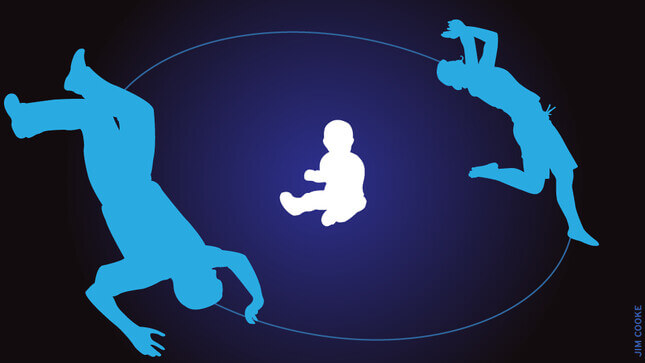Please, Please, Please: Do Not Make Your Kid The Center Of Your Universe
Latest

It’s so hard to know whether becoming a parent will ruin your life or be the only thing that makes it worth living. We may not get a grand verdict anytime soon, but new research has at least figured out one thing: moms who believe they are the most important person in their baby’s life and that they should always put the kid’s needs first are way more likely to be unhappy. Perhaps feeding them like a bird or hovering over them like helicopter is the key to their lasting happiness, but is it the key to yours?
This research, which was conducted by psychologist Miriam Liss, focused on “intensive” parenting, which is loosely guided by three main principles. The first is that mothers are the best people to care for their kids. Second, that parenting should be centered around the child’s needs rather than your own, and finally that kids should be thought of as “delightful and wholly fulfilling for parents.” Whoa, that’s intense indeed. And it resembles plenty of other parenting styles that seems to be happening everywhere these days: attachment parenting, helicopter parenting, and all sorts of other “my child is God” approaches. Liss says of this trend,
There’s something very appealing about these intensive parenting ideologies. [These attitudes] seem like they are how we should be feeling toward our children. But they may be more problematic than we think.
Despite evidence that this method is subscribed to by many parents, Liss found a lack of data about the mental impact of living it. So she set out to explore what happens when you go “intensive.” They had 181 mothers with kids under five fill out a series of online questionnaires in which they were asked about their “parenting attitudes, family support, life satisfaction and mental health.” They were asked to rate how strongly they agreed with these five beliefs involved in intensive parenting:
That moms are primary, that kids are entirely fulfilling, that children need lots of stimulation, that parenting is very challenging and that parents’ lives should revolve around their children.
What they found was that three of those five tenets were associated with unpleasant mental side effects for the mothers. It turned out that not that many women actually believed that they were more important than anybody else—even the father—in their kids’ life. But the women who did believe they were tops also reported being less satisfied with life, under more stress, and they also felt less family support than the other mothers. It makes sense that nominating yourself Commander-in-Chief of your child’s life would add some stress to your existence, and if that’s all you’re ever thinking about it’s easy to understand how you’d feel less satisfied too—since kids aren’t known for pulling you aside to offer heartfelt thanks for doing such a stellar job of caring for them.
Believing that parenting is a huge challenge also resulted in feeling less satisfied and more stressed and depressed. Liss says of this finding, “That one is a strongly held belief. Parenting being really, really hard is a commonly held belief that seems to be really bad for women.” If you think about it, going into something with a negative attitude doesn’t usually result it being hugely enjoyable; so it’d make sense if the same principle applies here. Finally, the researchers found that women practiced child-centered parenting also had lower life satisfaction. Interestingly, however, that correlation went away when they controlled for family support.
When taken together, these conclusions could help explain why other research has had such a hard time decided whether parenting makes people happier or makes them less happy. Liss explains,
Maybe it’s not having a child versus not having a child. Maybe there are certain ways of parenting, like this intensive style of parenting, that is more negative for parents’ mental health.
It’s impossible to say for sure that intensive parenting leads to depression and stress and being dissatisfied, but the links don’t really make sense if you flip them around. It’s also not clear whether intensive parenting has any great impact on the children, but Liss concludes that anything that makes moms depressed probably doesn’t benefit children in the long run. Plus, anecdotally some of us have observed that making your child the center of the universe tends to result in rather obnoxious offspring.
So if it’s not helping kids, and it’s making moms miserable, why are we doing it? Good question. Has the Supernanny taught us nothing? Have the French and their perfectly stylish and well-behaved bebes not made an impression? Still, even if we could figure out a way to stop turning our children into tiny black holes of need, there’s really no guarantee they’re still not going to make us miserable—intensive parenting or not. If only there was some kind of equation—involving complex factors like weather patterns, your score on the purity test, the stock market, and your shoe size—that could be used to determine what kind of effect having kids will have on you. And while we’re at it, maybe they could come with some kind of money back guarantee?
Moms Whose Lives Revolve Around Baby Suffer [LiveScience]
Image via Jim Cooke.